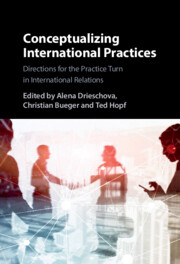Book contents
- Conceptualizing International Practices
- Conceptualizing International Practices
- Copyright page
- Contents
- Figures
- Table
- Contributors
- Acknowledgements
- Part I Introduction: Conversations and the Evolution of Practice Theorizing
- Part II Key Concepts of IR Scholarship
- 3 Epistemic Communities of Practice
- 4 Practices and Norms
- 5 The Normativity of International Practices
- 6 Resistance as Practice
- 7 For a Practice Approach to Authority
- 8 Evolution in International Practices
- Part III Innovative Concepts
- Part IV Conclusion: The Future of Practice Theorizing
- References
- Index
3 - Epistemic Communities of Practice
from Part II - Key Concepts of IR Scholarship
Published online by Cambridge University Press: 09 June 2022
- Conceptualizing International Practices
- Conceptualizing International Practices
- Copyright page
- Contents
- Figures
- Table
- Contributors
- Acknowledgements
- Part I Introduction: Conversations and the Evolution of Practice Theorizing
- Part II Key Concepts of IR Scholarship
- 3 Epistemic Communities of Practice
- 4 Practices and Norms
- 5 The Normativity of International Practices
- 6 Resistance as Practice
- 7 For a Practice Approach to Authority
- 8 Evolution in International Practices
- Part III Innovative Concepts
- Part IV Conclusion: The Future of Practice Theorizing
- References
- Index
Summary
The epistemic community research programme, which in the last generation helped frame International Relations understandings of the relationship between knowledge and power, rested on the influence of scientists and experts on policymaking through framing, persuasion, and socialization. In this chapter, we argue that while pioneering, the epistemic-community research programme was incomplete, since it neglected the relationship between knowledge, power, and practice. Because practices are at the core of what epistemic communities are, do, and aim to achieve, we suggest a pragmatist practice-based approach, according to which knowing requires active participation in social communities and knowledge is not a product but is bound with action. We, therefore, explain the political adoption of knowledge-generated practices by the very nature of practicing and joining communities of practice. With this purpose in mind, we propose understanding epistemic communities as epistemic communities of practice. By identifying epistemic communities as a special and heuristically important case of communities of practice, we will open new and exciting avenues of theory-making and empirical research. We illustrate our approach by examining the establishment of nuclear arms control verification practices during the Cold War and the recent spread of a populist ‘post-truth’ epistemic community of practice.
- Type
- Chapter
- Information
- Conceptualizing International PracticesDirections for the Practice Turn in International Relations, pp. 47 - 76Publisher: Cambridge University PressPrint publication year: 2022
- 8
- Cited by

